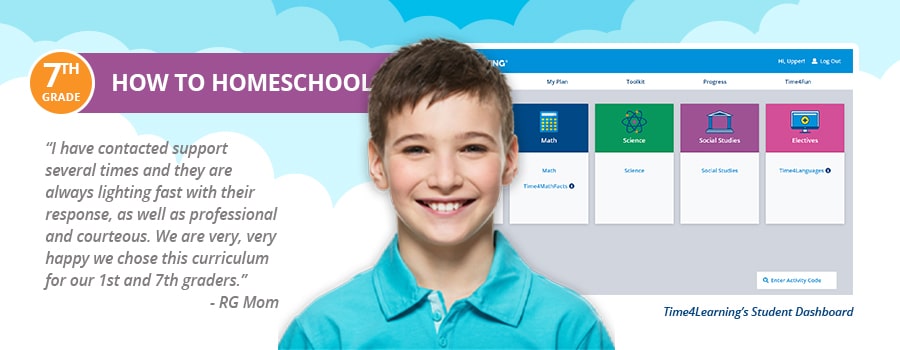How to Homeschool Seventh Grade
The seventh grade homeschool year is an exciting exploration of student independence. Because middle schoolers are ready to take more responsibility for their studies, parents will begin to take on more of a facilitator role than a teacher one. Your 7th grade homeschooler should be able to tackle more in-depth assignments and manage a busier academic schedule. 7th graders are commonly expected to be able to read complex texts, write papers, and use technology effectively across all subject areas.
Because your child’s academic success is so important, Time4Learning offers this guide to help you navigate the 7th grade homeschool path. Below, you will find information about:
- How to Homeschool Seventh Grade
- What Schedule is Best for Homeschooling 7th Grade?
- What Subjects are Taught in Seventh Grade?
- Seventh Grade Learning Objectives
- Reading Book List for Seventh Grade
- Seventh Grade Homeschooling Tips & Ideas
- How Time4Learning Can Help You Homeschool Your Seventh Grader
- Additional Seventh Grade Homeschooling Resources
How to Homeschool Seventh Grade
If the 7th grade homeschool year is your first year of home education, then you’ll need to take these steps before beginning:
- Research your specific state homeschool laws.
- Follow your state’s guidelines for school withdrawal and notification of homeschooling.
- Create a schedule or routine that allows some wiggle room.
- Set some learning objectives for your lessons.
- Plan out your homeschool year
- Make sure to keep track of your child’s work
- Assess your student’s progress
What Schedule is Best for a Seventh Grader?
In 7th grade, parents will homeschool roughly 4 hours a day. But remember, you’re homeschooling now, so you’re not tied down to a certain schedule or number of hours each day, and you’ll love the amount of flexibility. Find what works for you and your family.
When deciding on a 7th grade homeschool schedule, there are a number of factors you want to take into account:
- Your overall academic goals for 7th grade
- The number of extracurricular activities your student will be involved in
- The time of day that your homeschooler is most alert and attentive
- The type of curriculum you’ve chosen to use for this homeschool year
- Your family’s general work/life balance
Because this is a year when your homeschooler is becoming more independent, this is also an area where he or she should have plenty of input. Talk to your 7th grader about how they envision spending their day.
The best schedule for a seventh grader will be based on your overall goals and curriculum, but should also align with your student’s ideal rhythms and specific needs. Time4Learning’s free printable homeschool planner and goals, strengths, and needs planner can help!
Homeschooling Planner
Start planning out your homeschooling days with this free easy to use daily planner.
What Subjects Are Taught in Seventh Grade?
A typical course of study for seventh grade homeschoolers includes:
- Language Arts (including literature)
- Math
- Social Studies
- Science
In addition, many students homeschooling in 7th grade will incorporate some kind of physical fitness program. Of course, a well-rounded curriculum also includes homeschool electives that let your middle schooler explore a variety of interests such as foreign languages.
Seventh Grade Learning Objectives
The determination for what is taught in 7th grade is based on the outlined goals that are common to this grade level. In general, middle school is a time to strengthen study habits, identify interests, and build a foundation for educational success through high school and beyond.
Specifically, though, when answering the question, “What should my 7th grade be learning?” you may want to reach for objectives such as:
- Acquiring and correctly using new vocabulary
- Applying a range of strategies to comprehend, interpret, and evaluate fiction and non-fiction writing
- Using the writing process to research, draft and edit organized, multi-paragraph essays
- Utilizing primary and secondary sources to support an idea or position when writing
- Using graphic organizers, maps, charts, timelines, and other graphic representations to collect and analyze information
- Applying mathematical reasoning through structured problem-solving techniques
- Solving real-world and mathematical problems using numerical and algebraic expressions, equations, and inequalities
- Building scientific literacy by using using claims, evidence, and reasoning to evaluate scientific information
- Comparing and contrasting different interpretations of current and historical events
Reading Book List for Seventh Grade
Your seventh grader is developing in so many ways–physically, emotionally, and intellectually. The literature they read during this time helps shape their understanding of themselves and the world around them. For that reason, it’s important to include quality fiction and nonfiction books as part of their seventh grade language arts curriculum.
Some of the books we recommend for 7th grade include:
- The Scarlet Pimpernel by Baroness Orczy
- The Wreckers (High Seas Adventure) by Iain Lawrence
- The Wright Brothers: Powered Flight (the Scientists who Have Changed the World) by Anna Sproule
- Hero on a Bicycle by Alice Hoffman
- Dragon Castle by Joseph Bruchac
Seventh Grade Homeschooling Tips & Ideas
Homeschooling has so much to do with things other than teaching but here are our ten tips for getting started with homeschooling your seventh grader.
- Your state’s department of education website can be an invaluable resource for what a typical course of study for your child’s grade level includes. This should only serve as a comparative tool, however, since ultimately, a homeschool student’s coursework is determined by the student and parent.
- Homeschooling middle school doesn’t have to break the bank. Many of the books and resources needed to homeschool a 7th grader are available for free or at minimal cost online, at your local library, via used bookstores, or by trading off with other homeschool families.
- 7th grade homeschoolers may benefit from being part of a homeschool “cooperative.” These local and regional learning groups are made of families who want to give their homeschoolers access to multi-child learning and a wider variety of expertise in specific subjects.
- Any student who spends time on the internet on either a computer or mobile device should be taught the basic principles of internet safety — understanding how their activity on the web affects their personal safety and privacy and can open the information on their computer to security risks.
- Prevent burnout by scheduling regular outings with other families. Find out if your area has a local homeschool support group or meetups at the library and get involved with field trips, clubs, and community service activities they offer.
- If your student has a learning difference or disability, you may qualify for special education benefits through your local school system — even as a homeschooler. Check your state homeschooling laws and your local school system guidelines to find out.
- Your seventh grader is likely smack dab in the middle of puberty, so be careful not to attribute all emotional upheaval as related to homeschooling. This is an age where students are going through tremendous mental and physical changes, and it’s common for them to be moody — no matter their schooling situation.
- Depending on your child’s dominant learning style, they may be attracted to a specific type of curriculum. For example, auditory learners may retain material more easily when presented in podcast form. And hands-on learners can make sense of math instruction that includes manipulatives.
- Don’t get so focused on the academic goals of your homeschool year that you forget to enjoy just learning together.
- Individuals tend to have a “best” time of day for learning and skill-building. Your seventh grader will likely perform at their peak if the majority of their homeschool studies are carried out during this period of the day — even if that means late at night!
How Time4Learning Can Help You Homeschool Your Seventh Grader
For seventh graders, Time4Learning provides language arts, math, social studies, and science, plus optional foreign language courses. Within the program, subjects are organized into multimedia chapters with interactive lessons, and graded activities. Using an automated software system, seventh graders are guided through the online activities at their own pace based on their learning levels.
Some of the reasons that Time4Learning is such a popular 7th grade resource for homeschooling families include:
- Students get individual logins and work at their own pace which can lead to more effective learning
- Parents can set the grade levels independently for each subject so students learn at their own speed
- Standards-based learning designed to prepare students for the rigors of high school courses
- Member-only access to detailed printable lesson plans and homeschool teaching tools to review lesson contents
- Time-stamping feature on the activities for attendance and record keeping
- Automated grading makes record-keeping simple and homeschool portfolios a breeze
- Multiple avenues of support for parents including a responsive customer service team and an active Facebook group.
- Affordable no-contract membership backed by a 14-day money-back guarantee. You can start, stop, or pause your membership at any time without penalty.
Additional Seventh Grade Homeschool Resources
Return to the 7th-Grade Curriculum Overview. Or explore the our other seventh-grade resources:
- How to Homeschool Seventh-Grade
- Seventh-Grade Math Curriculum
- Seventh-Grade ELA Language Arts Curriculum
- Seventh-Grade Science Curriculum
- Seventh-Grade Social Studies & History Curriculum






